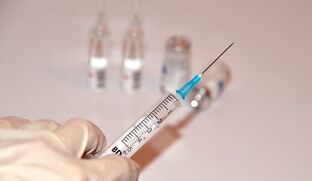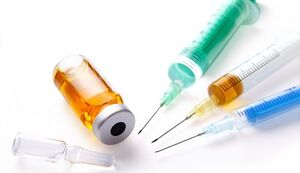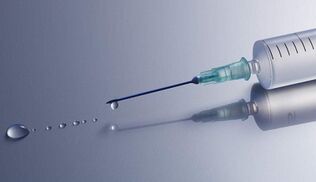
Prostatitis injections are the most effective dosage form. Injections act on the injury much faster than pills or suppositories. But treatment with injections of prostatitis is prescribed for special indications and also has a number of contraindications.
Advantages and disadvantages of injections for prostatitis
To understand what is best for suppositories, pills or injections for prostatitis, you need to consider the benefits of injections:
- Performance.The active substances enter the bloodstream instantly, reaching the center of the inflammation in 5 to 10 minutes. It takes longer to dissolve pills and suppositories. The pills work especially for a long time, since they must first pass through the digestive tract to be absorbed into the blood.
- Ability to use an accurate dosage.During treatment with injection, all the necessary concentration of the drug enters the bloodstream. When using pills, a certain part of the active substances is destroyed under the influence of stomach enzymes.
- Ease of execution.Injections can be administered regardless of the patient's condition. For example, when a patient is plagued by vomiting and cannot take pills.
Disadvantages of injection:
- The need for help from a health professional.
- Problem, procedure pain.
- Risk of infection at the puncture site.
- The likelihood of developing negative consequences with an incorrect injection, for example, redness, inflammatory or purulent process.
Therefore, the use of injections to exacerbate prostatitis is much more effective than other dosage forms, but inconvenient for self-treatment.
When injections are prescribed for inflammation of the prostate
Prostatitis injections in men are used mainly in the acute form of the condition. It is accompanied by severe symptoms, for example, severe pain, difficulty urinating. Such manifestations significantly reduce the patient's quality of life, therefore, they require immediate elimination.
In addition to the acute type of inflammation of the prostate, injections can be prescribed for:
- chronic form of prostatitis, if it is of bacterial origin;
- blood stagnation in the small pelvis;
- severe erectile dysfunction;
- infertility;
- blood circulation failures in the groin area;
- Infectious lesions of organs adjacent to the prostate.
Injections are often given after surgery in the urinary system.
What injections are given for prostatitis
Prostatitis injections are prescribed differently, depending on the cause of the development of the disease, the existing symptoms. The attending physician must select groups of drugs, self-medication with injections is strictly prohibited to prevent the disease from getting worse.
Antibiotics

Antibacterial injections are designed to combat pathogenic microorganisms that cause the development of an inflammatory process in the prostate. By destroying bacteria, the drugs help to restore the affected tissues of the prostate.
It is important to understand that antibiotic treatment should be carried out strictly in cycles. Even if the patient feels better, all symptoms have disappeared, the number of injections prescribed has yet to be completed. Otherwise, the therapy will be considered incomplete, the pathology will return and is more likely to become chronic.
Painkillers
Injections for pain in prostatitis in men are generally prescribed for the acute form of the condition, as it is accompanied by strong painful sensations. These injections are used if the syndrome is so severe that the patient is unable to go to the bathroom completely, or even sit or move.
These drugs eliminate the pain syndrome, normalize the condition of the prostate tissues and relieve spasms. But its long-term use is not allowed. The average period of therapy is 1-3 days.
Immunomodulators
Immunomodulators are designed to support the functioning of the immune system. They are used more often in the chronic form of prostatitis, if the body is no longer able to fight independently against pathogenic microorganisms.
It should be noted that doctors are still debating whether the use of immunomodulators is justified. The effect of these drugs on the body is believed to be unpredictable. Ideally, the attending physician should perform immunological studies before prescribing them.
Anti-inflammatory
Prostatitis is an inflammatory process in the prostate. It is on him that the main effect must be exerted during treatment. Therefore, anti-inflammatory drugs are the main components of therapy.
Doctors prefer injections for chronic and acute prostatitis, such as diclofenac and ibuprofen. They are able to quickly relieve inflammation, as well as eliminate pain and fever.
Decongestants
When inflammation occurs, the prostate tissue swells. Decongestant injections can normalize your condition. Its active component is testicular hyaluronidase, obtained from the testicles of cattle.
Drugs soften connective tissues, improve blood flow, relieve swelling of the prostate and prevent scarring. The therapeutic course is 10 days, one daily injection.
Hot injections

The use of hot injections to treat prostatitis in men involves introducing a special medication into the bloodstream. This name was given to the injections, because after them the patient feels a strong heat wave throughout the body. The substance helps to relieve inflammation, eliminates the symptoms of the disease.
It should be noted that contact with the skin can cause tissue damage. The dosage is determined by the attending physician. If not observed, nausea, a sharp drop in blood pressure and loss of consciousness can occur.
Aloe injections
Among the cheap and effective injections for prostatitis, aloe injections are mentioned, which help to achieve the following result:
- improve blood circulation in the small pelvis, reduce blood viscosity, which allows to eliminate congestion, normalize the nutrition of prostate tissues;
- to destroy pathogenic microorganisms that cause inflammation in the prostate. Therefore, injections are often administered in conjunction with antibiotic therapy to increase the effect of antibiotics;
- get rid of inflammation in the affected organ;
- strengthens the immune system, which speeds up men's recovery.
Aloe injections are prescribed at a dose of 1 ml per day. The duration of treatment is one month. If necessary, repeat the course after an interval of 2 weeks. In chronic inflammation of the prostate, it is recommended to undergo 3-4 months of therapy.
Contraindications for marking injections
Even the best injections for prostatitis have a certain list of contraindications, depending on the active ingredient. Among the general prohibitions for all injections, the atrophy of muscle tissues, skin damage and subcutaneous fat at the puncture site can be highlighted. If you do not take into account the contraindications, there is a risk of developing various diseases or their exacerbation, as well as an allergic reaction.
Thus, injections in the treatment of prostatitis are administered in the acute form, when it is necessary to quickly eliminate the expressed symptoms of the disease. In other cases, rectal suppositories and tablets are used.
























